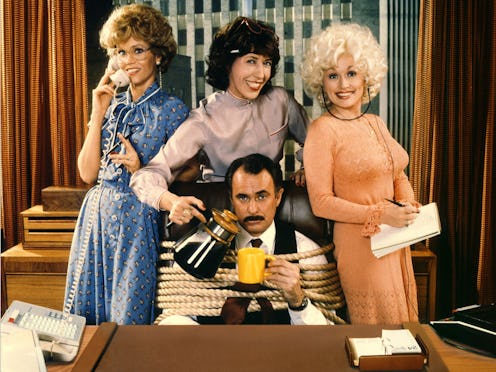As a writer and editor, I’ve gone back and forth many times between freelancing (read: working for a hundred bosses instead of one) and full-time employment. Both have their benefits and drawbacks, and what you gain in one scenario you typically lose in another. For the sake of your sanity, as you slog away in the office, looking longingly out of your cubicle and dreaming of freer times, I’ve decided it might be helpful to outline some of the reasons why it’s actually pretty great to have the one thing most millennials shun or would like to shun: gainful employment.
Why Having A "Real" Job Is Still Cool
America is set up in this super-bizarre way that requires your employer to care for you as if you were its child, providing you with health insurance and, ideally, other benefits. It has to put you in time out on more than one occasion before it can outright get rid of you. (Hopefully your parents never ousted you for bad behavior, but you get the point.) What's more, it has to care if you're sick, bereaved or just need a break from the office.
When you're freelance, you can get the ax at any time, you have to brave the battlefield that is the insurance exchange and no one you report to gives a sh*t about your personal problems.
I realize that in many jobs, coworkers are the worst part, but there's always someone with whom you can forge a friendship. (If not, you may want to look for a new job.) When you're freelance, you have to force yourself to make dates with other people, lest you end up like Tom Hanks in Castaway, personifying your inanimate objects just to have some company.
You may be thinking, Okay, but I'd rather hang out with the friends I choose than with a bunch of people I'm forced into contact with; however, I would argue that in-office jobs introduce you to types of people you may not otherwise meet, and can thus broaden your horizons. Plus, these are the connections that may come back to boost (or save) your career down the line. I used to work at MySpace, and we call our fellow alumni "the MySpace mafia," because if you're in it, you'll basically never be unemployed (unless you want to be).
This ties into the prior slide, but takes it a step further. In today's world, there is less of a tribal element to the lives of most Americans than ever before, and the New York Times says the result is an epidemic of loneliness (as detrimental to our health as smoking, apparently). We've moved away from our families, belong to fewer religious institutions, etc., and the results are frightening. Psychology Today cites a small town of Italian immigrants in the '60s that operated tribally and reported far better health than the rest of the nation, only to sink to the rest of the country's level once the nature of the town's cohesiveness changed with the times. (Basically, people started to watch TV instead of hang out together.)
Workplaces offer you a tribe and add a layer to your identity. That's why it's important to actually want to identify with the place you work!
As a consultant or freelancer, you're getting paid for deliverables, which means if you don't deliver them, you don't get paid. The same is sort of true for a full-time job, but it's easier to have the (very) occasional hangover day or the like and not worry too much about how your productivity on that single day is going to affect your overall livelihood.
Okay, this is one of the things I like least about office work, but it's also one of the best, somehow. When I freelance, I eat whatever is in my house, and I have a longstanding policy of banning chips, cookies, cakes and other processed snack foods from my cupboards. This is great for my health but terrible for my focus, as all I can think about come 3 or 4pm is where are my cupcakes/Swedish fish/straight shots of sugar?
